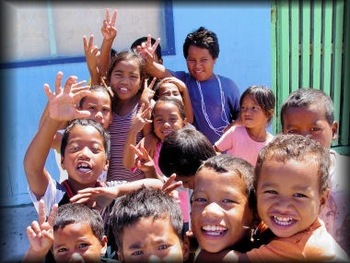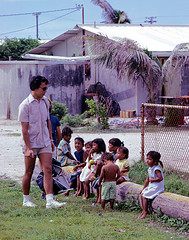RMI Education and Skills Strengthening Project
The Government of the Republic of Marshall Islands has actually gotten financing from the World Bank for the Education and Skills Strengthening Project (ESSP) cost. It intends to apply part of the profits for seeking advice from services.
The consulting services ("the Services") will assist the Project Manager and the RMI National Training Council in executing the World Bank-funded task successfully.
The assignment will concentrate on supporting the Project Implementation Unit (PIU) in creating a framework for Recognition of Prior Learning (RPL) for TVET, aimed at helping the College of the Marshall Islands and the RMI National Training Council evaluate and enhance the abilities of workers through certified college accreditation.
The in-depth Terms of Reference (TOR) for the project are shown in the attached Terms of Reference (ToR).

The National Training Council now welcomes eligible people ("Consultants") to indicate their interest in offering the Services. Interested Consultants must supply info demonstrating that they have actually the required certifications and appropriate experience to carry out the Services (attach a Cover Letter of no greater than four (4) pages dealing with the obligatory experience and qualification requirements curriculum vitae with a description of experience in comparable tasks, similar conditions, and so on). Firms' staff might reveal interest through the utilizing firm for the task. In such a circumstance, only the experience and credentials of individuals will be considered in the choice process. The requirements for choosing the Consultant are: A.
Mandatory Qualifications and Experience Master's degree in education, training
, management, or a related field. Minimum of 5-10 years of experience working in TVET System. Curriculum Design and Systems.
Possess 2-5 years' experience creating and
carrying out RPL. frameworks, policies, and treatments. A sample of previous work will be needed as evidence of previous experience. Outstanding interaction, training, and assistance
abilities. Experience with working with varied stakeholders, including government. companies, TVET organizations, companies, and learners in the Pacific. B. Desired Qualifications and Experience Capability to deal sensitively in a multicultural
environment and construct reliable team relationships with customers and pertinent stakeholders. The attention of interested Consultants (including companies )is drawn to paragraphs 3.14, 3.16 and 3.17 of the World Bank's"

Procurement Regulations for IPF Borrowers "July 2016 modified November 2020" Procurement Regulations ", setting forth the World Bank's policy on dispute of interest. Additional details can be obtained at the address listed below throughout workplace hours, 0900 to 1700 local time. Expressions of interest need to be
provided in a written form to the address listed below (in person or by email )by 5:00 pm, 23rd December 2024.
The subject line ought to state:"National Training Council Strategic Plan Consultant -complete name of the prospect". Julius Lucky Director National Training Council!.?.!ntcdr@ntcinfo.org:Phone: 692 625-4521 Empowering Community Champions for Sustainable Development in RMI Gender Equality, Climate Resilience and Water Safety Training Majuro,
Republic of the Marshall Islands: The 4th
Women and Youth Training for
Gender Equality, Climate Change, Disaster Risk Reduction and Water Safety Management has just recently happened at the University of the South Pacific's campus in Majuro, the Republic of the Marshall Islands(RMI ). This crucial training was arranged by the United Nations Development Programme( UNDP )Pacific Office through the Addressing Climate Vulnerability in the Water Sector(ACWA) task. The week-long capacity-building training aimed to empower women and youth with the understanding and practices required for climate-resilient water security management in the
Republic of the Marshall Islands(RMI ). This training enhances a commitment to enhancing rmi national training council's water security and community strength against climate change impacts, particularly ladies
and youth, making sure that nobody is left behind. The training invited individuals from all 24 atolls and included resource speakers from government companies, non-governmental organizations, and worldwide advancement partners from the RMI Environmental Protection Authority, Climate Change Directorate, Office of the Chief Secretary, Ministry of Culture and Internal Affairs, National Disaster Management Office, Women United Together Marshall Islands, RMI Human Trafficking Task Force, Waan Aelõñ in Majel, Jo-Jikum, and the International Organization for Migration. In her opening remarks, Secretary for the Ministry of Culture and Internal Affairs, Brenda Alik, highlighted the significance of cumulative action in building a climate-resilient country."It is our responsibility to come together and collaborate. As we deal with the obstacles postured by climate modification, comprehending its impact on our water resources is important for enhancing the well-being of neighborhoods throughout the Marshall Islands,"she said.
RMI Environmental Protection Authority General Manager Moriana Philip highlighted in her speech the necessary function of ladies and youth in dealing with climate-related difficulties."This workshop unifies us from different communities to resolve the pressing concerns we face today, including climate-related obstacles, especially on our water resources."We wish to highlight the essential role of ladies and youth in this project as your participation contributes to its success and beyond, "she stated.
The very first day of the workshop covered critical problems connected to gender equality, human rights, and public health within the Marshall Islands. It consisted of conversations on gender equality and mainstreaming, focusing on the impacts of environment change on water security and the out of proportion impacts on susceptible groups. The importance of integrating gender equality and social inclusion into all task aspects was also talked about. Human rights and human trafficking were tackled, worrying the requirement for extensive security of susceptible populations
during emergencies. Furthermore, the workshop dealt with gender-based violence, highlighting the various kinds that can emerge in catastrophe situations, such as domestic violence and sexual coercion. The agenda concluded with a focus on sanitation and hygiene and their important role in health, livelihoods, school attendance, self-respect, and structure resistant neighborhoods. ACWA Project Manager Koji Kumamaru expressed his thankfulness to all individuals
, emphasizing the value of their contributions to their neighborhoods."Women and youth are key to the success of the ACWA job. More significantly, you are the champions and future leaders who will go back to your neighborhoods to empower others,"he said. Throughout the workshop, participants went to Rongrong Island and took a look at the 15,000-gallon Flatpack Modular water tank set up at the Rongrong High School Boys Dormitory as part of the ACWA project. The setup is a crucial element of the task, matched by assistance from Australia
's Department of Foreign Affairs and Trade. The check out acted as an important firsthand experience of the positive impact of the ACWA task on the community and its

water resources. Marie Naisher from Jabat Island expressed her gratitude for the chance to sign up with the workshop and explained her desire to be part of the task when it reaches Jabat.

"This was my first time taking part in such training, and I learned so much from the guest speakers, group activities, and the site check out. I now comprehend the value of clean water and how to sterilize it. I'm ecstatic about the ACWA project pertaining to Jabat and prepared to assist when it shows up,"she said. Don Kobney, an ACWA website planner from Santo, Kwajalein, likewise shared his enjoyment."The workshop and website see enhanced my confidence and understanding of the water tank installation.
Seeing the 15,000-gallon flatpack modular water tank firsthand provided me a clear understanding of the system, and I'm eagerly anticipating sharing this knowledge with my neighborhood, "he said. By the workshop's end, participants were much better equipped to understand environment change and its regional impacts, drive adjustment and mitigation efforts, particularly in water safety, and utilize new resources to affect their communities positively. ACWA is enabled thanks to the assistance of the Green Climate
Fund, with the task co-financed by the Government of the Republic of the Marshall Islands
. The Marshall Islands: Skills Training and Vocational Education Project Evaluates the efficiency of the job and highlights lessons. Offers inputs to 2 broader assessments- the local assessment of ADB support for the Pacific and the unique assessment study on Millennium Development Goals. The low educational achievement and shortage of Marshallese skilled workers were mainly due to the poor quality of basic education, absence of access to education in the outer islands, and weak points in abilities training and the vocational and technical education system.
These supported an economy marked by high joblessness because of constrained economic sector growth and federal government downsizing. Joblessness was specifically high among the youth and ladies in the outer islands. Ideal regional competent personnel for existing task vacancies
were not available, thus the importation of properly knowledgeable foreign employees. Therefore, there was an inequality between offered jobs and skills of the Marshallese labour force. These conditions supplied the initiative for the Government
of the Marshall Islands to focus on technical and professional education training reforms. In 2000, ADB approved a loan for $9.1 million to improve skills training to offer well-trained workers needed for sustained financial and social development. This was to be achieved through an integrated nationwide skills training system. The project consisted of four parts: development of a career awareness program, skills training enhancement, improved abilities training chances for ladies and youth, and institutional strengthening. The expected outcome was increased income-generating chances and work for students, specifically women and youth in the outer islands. Overall, the job was rated not successful. Restricted development was accomplished in making the job responsive to the requirements of its recipients and private-sector employers. The enduring weak point of bad numeracy and literacy competencies
among public primary and secondary school graduates and dropouts going into college or participating in voc-tech education could be partly credited to the poor quality of standard education. The job was supply-driven and might not develop a strong linkage with private sector requirements or align its activities with the needs of the labour market. The status of the technical and occupation education training system has actually stayed fundamentally the very same after task completion. The research study advanced that ADB might encourage the Government of the Marshall Islands, through assessment and policy dialogue, to follow through on the government's
commitment to developing a dedicated labour details system to connect technical and professional education training program offerings with industry demand. Although the job set up a labour market information system, in the absence of internal staff ability at the National Training Council, it was not completely operational.







